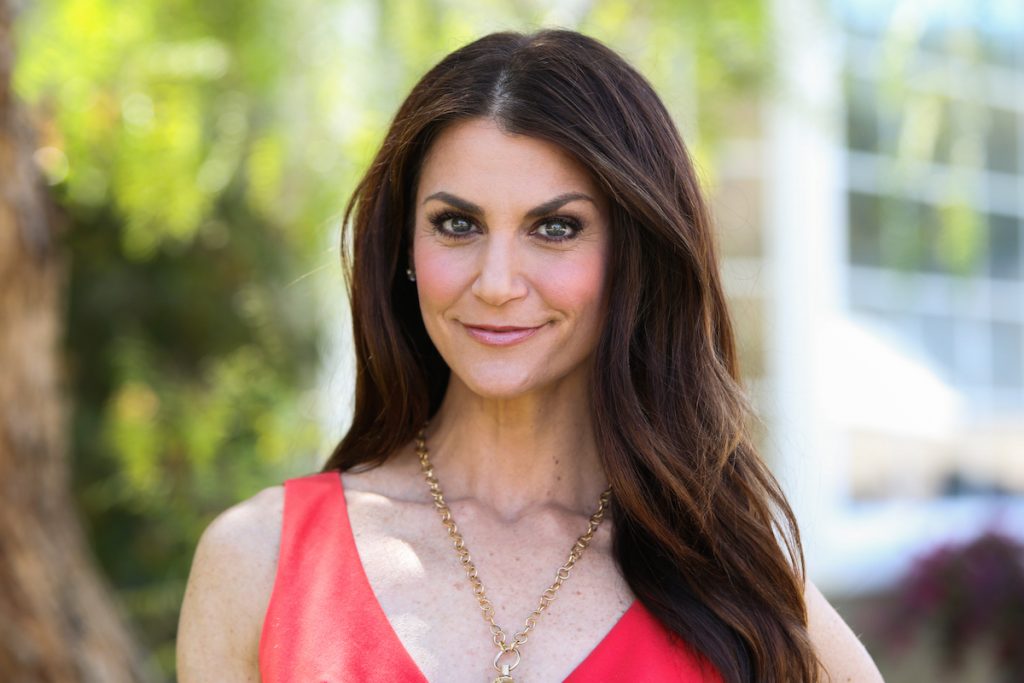Facing a Breast Cancer Recurrence
- TV personality Samantha Harris, a 10-year breast cancer survivor, has announced that she has been diagnosed with breast cancer for the second time, sharing the news to her Instagram page on Wednesday.
- When diagnosed with cancer or a recurrence from the disease, it is important to know that there is nothing that you did wrong. Cancer can affect any of us. Unfortunately, even people who are very healthy.
- In the breast cancer space, there are constant efforts from researchers and drug makers to develop therapies that can not only treat cancer better, but reduce the risk of it returning. There have been many promising advancements since Harris was diagnosed with breast cancer in 2014. There is more hope than ever.
“I never thought I would have to share this…again,” Harris, 50, captioned an Instagram clip sharing her health news. “#IwillBeOkay.”
Read MoreView this post on Instagram
“And I am so grateful for my family and my close friends,” Harris added. “And as I lean on them, I reach out to lean on you during this time and I will continue to share more as my treatment plan unravels and … see you soon.”
The Your Healthiest Healthy author and podcast host was then flooded with well wishes and comments from organizations like Susan G. Komen and fellow survivors in the breast cancer community.
“I’m so sorry,” one supporter wrote. “You have been my helper and support through so many years. You are doing all the right things. I pray your doctors will get you the very very very best treatment. You are the most beautiful woman. I have tears of my eyes I’m so sorry you will be OK. I know you will.”
“I love you! I am here for you day or night,” wrote a close friend. “You are never alone and we will all get through this together!!!”
Ever since Harris got through cancer at age 40, she has dedicated her life to the health and wellness space, pivoting from entertainment journalism at outlets like Entertainment Tonight to launching her own health and wellness brand.

Just this week, she spoke of the importance of lowering stress in the body with an anti-inflammatory diet, as many experts agree that lowering cortisol, a stress hormone, can help reduce your chance of disease.
“… focus on eating fewer processed foods and more whole foods,” she wrote via Instagram on Tuesday alongside a radiant, bare-faced photo of herself at the beach.
When diagnosed with cancer or a recurrence from the disease, it is important to know that there is nothing that you did wrong. Cancer can affect any of us. Unfortunately, even people who are very healthy.
Major Reduction in Cancer Risk by Following Old Standbys: Diet and Exercise
But that doesn’t mean that you should stop making your healthy lifestyle a priority. In this case, there is no way to determine what exactly caused the cancer or the recurrence.
A Mammogram Missed Her Breast Cancer
Harris was first diagnosed with breast cancer in March 2014 despite doctors finding no evidence of the disease on her mammogram.
“It missed the cancer in my right breast,” Harris said on her blog at the time. “Two doctors told me the lump I found 11 days later was ‘nothing.’”
Thankfully, Harris advocated for her health and feeling that something was amiss, felt the need to investigate further to be sure.
“Finally, four months after finding that lump, I went to see a breast cancer specialist (a surgical oncologist), someone whose main job it is to look at breasts all day and specializes in the detection of breast cancer.”

After a follow-up MRI, biopsy, and ultrasound, Harris’ cancer was still not found. But doctors decided to remove some of her breasts for further testing because they could tell “something was not right.”
“We decided to take it out,” she explained. “Thank goodness, because when the pathology from that lumpectomy came back, it was indeed invasive carcinoma, in addition to the less concerning ductal carcinoma in situ.”
She treated her breast cancer with a bilateral mastectomy, also called a double mastectomy, which removes both breasts. After that, she underwent breast reconstructive surgery.
During reconstruction, plastic surgeons can reconstruct your breasts with implants or with your tissue taken from some other place on your body, such as your back, your abdomen, or your inner thigh.
Harris’ cancer did spread to one lymph node, but doctors decided she didn’t need chemotherapy or radiation. Though a mastectomy, or the removal of breast tissue, can reduce the risk of a recurrence, it’s important to know that the cancer can still recur in the tissue that lines the chest wall or in the skin, according to Mayo Clinic.
Harris has not yet shared the specifics of her new diagnosis.
Learning About Breast Cancer Recurrence
While the chance of recurrence varies based on the biology of the tumor, the stage it was when diagnosed and the treatment received, according to the Susan G. Komen organization, “Most people diagnosed with breast cancer will never have a recurrence.”
“Once a patient has finished his or her active therapy for breast cancer, we will often refer to that time as breast cancer survivorship,” says Dr. Erica Mayer, a breast cancer medical oncologist at Dana Farber Cancer Institute. “This is a time when patients are still being actively monitored by their treatment team, not only to ensure that they remain healthy and cancer-free in the years ahead, but also making sure that they have recovered from any side effects of their initial treatment, and that they are pursuing healthy behaviors” for example, getting regular exercise, eating a healthy diet, and keeping up with all their other routine medical care.”
But as with Harris’ story, recurrence does happen, so it’s important to do everything you can to reduce your risk. Here are some tips:
1. Follow Treatment Guidelines
“The best way to reduce your risk of recurrence with breast cancer is to follow treatment guidelines and complete the course of treatment that’s given,” says Dr. Elisa Port, a surgical oncologist specializing in breast cancer at Mount Sinai, recently sat down with SurvivorNet and offered the following advice.
For example, Dr. Port explained that many women have breast cancer that’s hormonally driven, and there are treatments that they give, such as pills like Tamoxifen or aromatase inhibitors, to reduce the risk of these hormonally-driven cancers coming back. The issue is that the course of treatment may call for patients to take the pills for 5-10 years. While some have no side effects, others may experience a host of unpleasant side effects, even to the point where they’re severely debilitated and have no quality of life on these medications.
“So the challenge is to work with every individual person to make sure we give her the best chance of getting through these treatments and enjoying the benefits of these treatments, which is the lowest rate of cancer coming back,” Dr. Port explained.

2. Maintain a Healthy Weight
Maintaining a healthy weight may also reduce the risk.
“We know that — obesity or being overweight can increase the risk of cancer recurrence in breast cancer,” Port says. “And so I say, maintaining a healthy body weight, whatever that is for the individual … You know, we talk a lot about healthy body weight, and there’s a very big range of this, but there are certain numbers beyond which it does affect one’s health. So we try to keep people within a range of a healthy body weight.”
3. Limit Alcohol
Dr. Port said the other lifestyle factor that may increase one’s risk of breast cancer recurrence is heavy alcohol intake.
“We say alcohol in moderation is probably fine, which is defined as three to five drinks a week. More than that can also potentially increase the risk of recurrence. So the big lifestyle factors are healthy body weight and moderate alcohol intake.”
4. Eat a Healthy Diet
Dr. Port added that there’s no one dietary element that you can eat or consume to give you an edge against breast cancer recurrence. It’s not eating more broccoli or eating more blueberries or becoming a vegetarian. She says the fact that sugar feeds cancer is a big myth too. However, everything you eat does contribute to your overall health.
“These things are all really helpful in maintaining an overall healthy well-balanced diet and also to maintain healthy body weight. We know that diets that are heavy in sugar content are also usually unhealthy and can lead to weight issues. So it all really funnels back to maintaining a healthy body weight when it comes to lifestyle factors.”
It’s Very Important to Connect: A Survivor’s Advice For Getting Through Cancer
5. Exercise
This goes hand-in-hand with maintaining a healthy weight. Our experts say that there is evolving data to suggest that it decreases the risk of breast cancer significantly. As Harris has noted, it decreases the overall inflammation in the body.
Exercise doesn’t have to mean you join a gym and run 20 miles a week. But for many people, getting diagnosed is a way to jumpstart their lives and take better care of themselves.
While these tips may help reduce your risk, experts say it’s important to understand that if a recurrence happens, it’s not your fault, and there’s nothing you can do to guarantee that cancer won’t come back. The best you can do is work with your health care providers to come up with a plan that best reduces your risk for recurrence while allowing you to embrace and enjoy your life in the present.
CDK4/6 Inhibitors Can Help Reduce Chance of Breast Cancer Recurrence
In the breast cancer space, there are constant efforts from researchers and drug makers to develop therapies that can not only treat cancer better, but reduce the risk of it returning. There have been many promising advancements since Harris was diagnosed with breast cancer. There is more hope than ever.
For women with a common subtype of breast cancer — hormone-receptor-positive and HER2-negative (HR+ and HER2-) — a newer class of drugs called CDK4/6 inhibitors are showing promise.
CDK4/6 inhibitors work to interrupt the growth of cancer cells. SurvivorNet sat down with Dr. Eleonora Teplinsky, Head of Breast Medical Oncology at Valley Health System, to discuss how a CDK4/6 inhibitor, Ribociclib (sold under brand names Kisqali and Kryxana), is being studied for women with this specific type of breast cancer.
What are CDK4/6 inhibitors? Understanding Risks vs. Benefits
Referencing data obtained from the NATALEE phase III clinical trial, Dr. Teplinsky explained how breast cancer patients who received Ribociclib along with endocrine therapy (the current recommended treatment) had a 25% lower risk in recurrence or death.
Prior to the study, “Ribociclib was already approved for metastatic hormone receptor-positive breast cancer, but this study was looking to see if it has benefits in reducing recurrence in earlier stage breast cancer,” she explained.
The study looked at something called disease-free survival, which means patients are alive without their cancer recurring.
“In the group that received Ribociclib and endocrine therapy … at three years their disease-free survival was 90.4% compared to 87.1% in the group that received endocrine therapy alone,” Dr. Teplinsky said. This translates to a 3.3% “absolute improvement.”
It’s important to note that this therapy option is not currently FDA-approved.
How Does the CDK4/6 Inhibitor Work?
CDK4/6 inhibitors assist in slowing down cancer growth in women with HR+, HER2- breast cancer.
Generally speaking, CDK4/CDK6 inhibitors are targeted therapies that fight off proteins known as the cyclin-dependent kinases 4 and 6 (CDK4/CDK6).
These proteins control how fast cells divide and multiply, and for women with breast cancer, these proteins can cause cancer cells to grow uncontrollably. That’s how CDK4/CDK6 inhibitors can help they slow down or prevent the proteins from multiplying.
Dr. Teplinsky stressed that doctors and patients should work together and have a candid discussion about side effects to determine if using a CDK4/6 inhibitor like Ribociclib is worth it.
“This all depends on the disease characteristics. Let’s say someone is lymph node-negative and they have a tumor size of three centimeters. They, based on this study, would be eligible to receive Ribociclib,” she explained. ” … How do we make that decision and how do we have that conversation in the office about the risks and the benefits?
“We know there’s a 25% lower risk of recurrence. That’s great, but we also have to balance some of the side effects.”
She continued, “I think it’s a really hard decision for someone whose risk is a little bit lower to begin with, compared to someone who has a higher risk of recurrence. And how you navigate that is really going to be an individual conversation between patient and doctor and balancing all of those side effects with the benefit.”
Understanding Risk vs. Benefits
Dr. Teplinsky explained that it’s important for patients to understand the difference between “relative risk and absolute risk.”
While there was a 25% lower chance of cancer coming back among the population that did take Ribociclib in the NATALEE trial, “that translates into a 3.3% absolute risk,” she explained. “When you look at the numbers, 87.1% of patients who did not recieve Ribociclib did not experience a recurrence compared to 90.4% of patients who did receive Ribociclib and did not experience a recurrence.”
She continued, “I think the challenge, if you were a patient and trying to figure this out is, how do you know if you would fall into that 3.3%? And, and we don’t know.”
Dr. Teplinsky is prepared to speak with her patients about the new medication available for them as she sees the benefit in making her “patients partners in their healthcare and having them be their own health advocates.”
Common possible side effects of Ribociclib include:
- Neutropenia, which is a low count of a type of white blood cell called neutrophils, which helps fight certain infections
- Nausea
- Infections
- Fatigue
- Diarrhea
- Leukopenia, which is a low white blood cell count
- Vomiting
- Alopecia, a type of hair loss
- Headache
- Constipation
- Rash
- Cough
Dr. Teplinsky also notes that adverse effects include lung disease and elevated liver enzymes, which can indicate the liver is inflamed or damaged.
“I think it’s really important to say, ‘Look, we have this new medication, here are the benefits, here are the side effects,” Dr. Teplinsky added.
“Then really work through each individual patient about whether it’s something that is going to be right for them.”
What To Ask Your Doctor
- What is my prescribed regimen to help avoid a breast cancer recurrence?
- Are there steps I can take in my daily life to help avoid a breast cancer recurrence?
- Do you have recommendations for someone who doesn’t particularly enjoy exercise?
- Can you recommend a dietician who can help me with healthy eating tips and maintaining a healthy weight?
- What drugs are available for my type of cancer to help prevent a breast cancer recurrence?
Dr. Ann Partridge explains how supplements are selling cancer patients and survivors false hope
Contributing by SurvivorNet staff.
Learn more about SurvivorNet's rigorous medical review process.

